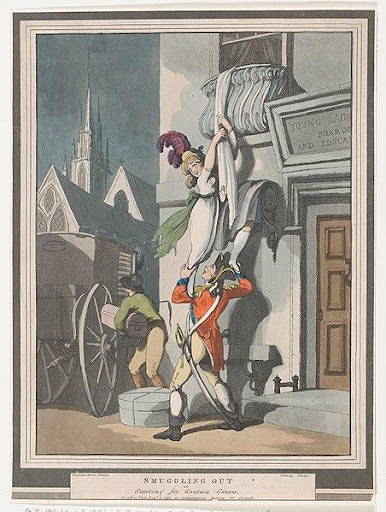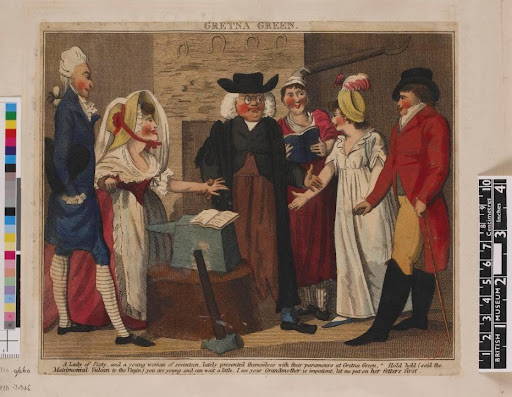Adelaide Magnolia Letter 13 – Clandestine Marriages
Gretna Green and Reputations

Smuggling Out, or Starting for Gretna Green. Etching print. Rowlandson, T; Schütz, HT. 1798. Courtesy of the MET
Elopements or clandestine marriages have been around for centuries. In regency England, these marriages all had one destination: Gretna Green in Scotland.
Lord Hardwicke’s Marriage Act of 1753, prevented any young person in Britan from entering matrimony under the age of 21 without the permission of their parents. However, Scotland did not change their law and boys as young as 14 and girls as young as 12 could wed without parental consent as long as they declared themselves before two witnesses.
With the construction of a toll road into the southern Scottish village of Graitney (Gretna) in the 1770’s, Gretna Green became the first easily reachable village over the Scottish border for couples to flee to in order to marry quickly and without the consent of parents. Scottish law also allowed anyone to perform marriages. The most legendary of these were the blacksmiths of the village. They were referred to as “anvil priests” and were said to “forge” the links of love in their shops. Hence the phrase “married over the anvil” became a popular term of the day to describe such unions.

Gretna Green. Laurie & Whittle c. 1795-1805. London. Courtesy of the British Museum
Gretna Green was a sensational place in Regency society. It became the location of elopements and clandestine marriages, and a topic for scandal among society. In 1818, to get from London to Gretna Green took an average of 4 days by mail coach or carriage and required frequent stops to rest horses and to spend nights at inns. The reputations of Regency young women were extremely brittle. Their behavior and decorum were very highly monitored and just one small slip-up could damage their reputation beyond repair. Fleeing, unchaperoned with a young man not related to her, was enough to ostracize her from fashionable social circles for good. You can imagine what staying a night unaccompanied at an inn with a man—even if the young people stayed in separate rooms—would do to her reputation.
In the case of elopement, any hope of saving a wealthy young lady’s fortune from belonging completely to her husband after she wed was up to her father, a male relative, or a male guardian figure. Once an elopement attempt was learned of, this male advocate could only hope to intercept the couple before the marriage took place. If he succeeded, he would most likely not be able to save the young lady’s reputation, but he could negotiate a marriage contract on her behalf, making careful stipulations that enabled her to retain at least part of her fortune after the marriage took place. If the young lady married before such a contract was negotiated, she, any children from the marriage, and her fortune would, by law, become her husband’s property.
As you can imagine, elopements of this nature were often utilized by fortune-hunters and rogues in order to gain a vast fortune. For example, handsome, charming, young gentlemen, looking to climb the social ladder, or in over their head’s financially, could simply convince a naïve heiress under the age of 21 of his love and devotion, persuade her of the necessity of eloping with him to Gretna Green, and voila! Financial problems solved. Not so for the young lady, her problems were just getting started. Without a father or other male relative to intercede and negotiate a marriage contract on her behalf, she had no way of retaining ownership of her fortune. And even if she did discover her intended’s true motives for marrying her before the deed was done, the act of eloping would have already damaged her reputation beyond repair. The lesser of the two evils was therefore to return to society a married woman and try to make the best of the rest of her life.
Sources:
https://en.wikipedia.org/wiki/Gretna_Green
https://www.historic-uk.com/HistoryUK/HistoryofScotland/Gretna-Green/
https://janeaustensworld.com/2015/10/31/oh-what-a-scandal-a-gretna-green-elopement-marriage-and-divorce/
https://blogs.ancestry.com.au/ancestry/2011/02/14/fame-and-scandal-amongst-a-century-of-runaway-weddings/
https://donnahatch.com/regency-pre-nuptial-agreements-the-marriage-agreement/
